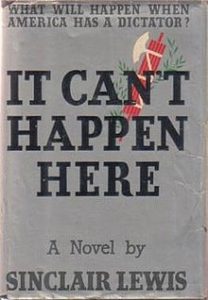Philip Roth ~ The Plot Against America
About The Plot Against America
Set in Newark, New Jersey, in the early 1940s, The Plot Against America tells the story of what it was like for the Roth family and Jews across the country when the isolationist aviation hero Charles Lindbergh was elected president of the United States. Roth’s richly imagined novel begins in 1940, with the landslide election of Lindbergh, who blamed the Jews for pushing America toward war with Nazi Germany. Lindbergh’s admiration of Hitler and his openly anti-Semitic speeches cause increasing turmoil in the Roth household, and in nine-year-old Philip, as political events at home and abroad overtake their daily lives. Alvin, the orphaned nephew the family has taken in, runs away to Canada to fight the Nazis. Sandy, Philip’s older brother, ascribes his parents’ fears to paranoia and embraces Lindbergh’s Just Folks program, which sends him and other Jewish children to live in the “heartland” for a summer. Philip’s mother, Bess, wants the family to flee to Canada before it is too late to escape. But his fiercely idealistic father, Herman, refuses to abandon the country where he was born and raised as an American. Overwhelmed by the tensions around him, Philip tries to run away. “I wanted nothing to do with history,” he says. “I wanted to be a boy on the smallest scale possible. I wanted to be an orphan.” But history will not let go, and as America is whipped into a deadly frenzy by demagogues, the Roths and Jews everywhere begin to expect the worst. In The Plot Against America Philip Roth writes with a historical sweep and lyrical intimacy that have rarely been so skillfully combined. As the novel explores the convulsive collision of history and family, readers take a chilling look at devastating events that could have occurred in America–and consider the many possible histories existing beneath the one that actually happened.
About Philip Roth
In 1997 Philip Roth won the Pulitzer Prize for American Pastoral. In 1998 he received the National Medal of Arts at the White House, and in 2002 received the highest award of the American Academy of Arts and Letters, the Gold Medal in Fiction, previously awarded to John Dos Passos, William Faulkner, and Saul Bellow, among others. He has twice won the National Book Award, the PEN/Faulkner Award, and the National Book Critics Circle Award. In 2005 Philip Roth has become the third living American writer to have his work published in a comprehensive, definitive edition by the Library of America.
Source: http://www.houghtonmifflinbooks.com/
The Plot Against America – PDF-format: https://m.reddit.com/theplotagainstamericabyphiliproth/
Mudar Adas | On Friendship/(Collateral Damage) III
Marianne van Tilborg | On Friendship / (Collateral Damage) III
Shulamit Bruckstein Coruh | On Friendship/(Collateral Damage) III
Nina Pieters ~ Vrouwen van Geuzenveld
Nina Pieters volgde in opdracht van stadsdeel Geuzenveld-Slotermeer een jaar lang een groep allochtone vrouwen uit Geuzenveld bij hun hardlooptrainingen en voorbereidingen aan de Course Femine in Casablanca. De meeste deelneemsters hadden voordien nog nooit gesport of iets buiten het gezin gedaan. De film geeft een blik op hun sportieve en persoonlijke ontwikkeling.
Meer over Nina Pieters en haar werk: https://lasstichting.nl/
Sinclair Lewis ~ It Can’t Happen Here
It Can’t Happen Here is the only one of Sinclair Lewis’s later novels to match the power of Main Street, Babbitt, and Arrowsmith. A cautionary tale about the fragility of democracy, it is an alarming, eerily timeless look at how fascism could take hold in America.
Written during the Great Depression, when the country was largely oblivious to Hitler’s aggression, it juxtaposes sharp political satire with the chillingly realistic rise of a president who becomes a dictator to save the nation from welfare cheats, sex, crime, and a liberal press.
Called “a message to thinking Americans” by the Springfield Republican when it was published in 1935, It Can’t Happen Here is a shockingly prescient novel that remains as fresh and contemporary as today’s news.
Chapter I
THE handsome dining room of the Hotel Wessex, with its gilded plaster shields and the mural depicting the Green Mountains, had been reserved for the Ladies’ Night Dinner of the Fort Beulah Rotary Club.
Here in Vermont the affair was not so picturesque as it might have been on the Western prairies. Oh, it had its points: there was a skit in which Medary Cole (grist mill & feed store) and Louis Rotenstern (custom tailoring—pressing & cleaning) announced that they were those historic Vermonters, Brigham Young and Joseph Smith, and with their jokes about imaginary plural wives they got in ever so many funny digs at the ladies present. But the occasion was essentially serious. All of America was serious now, after the seven years of depression since 1929. It was just long enough after the Great War of 1914-18 for the young people who had been born in 1917 to be ready to go to college… or to another war, almost any old war that might be handy.
The features of this night among the Rotarians were nothing funny, at least not obviously funny, for they were the patriotic addresses of Brigadier General Herbert Y. Edgeways, U.S.A. (ret.), who dealt angrily with the topic “Peace through Defense—Millions for Arms but Not One Cent for Tribute,” and of Mrs. Adelaide Tarr Gimmitch— she who was no more renowned for her gallant anti-suffrage campaigning way back in 1919 than she was for having, during the Great War, kept the American soldiers entirely out of French cafés by the clever trick of sending them ten thousand sets of dominoes.
Nor could any social-minded patriot sneeze at her recent somewhat unappreciated effort to maintain the purity of the American Home by barring from the motion-picture industry all persons, actors or directors or cameramen, who had: (a) ever been divorced; (b) been born in any foreign country—except Great Britain, since Mrs. Gimmitch thought very highly of Queen Mary, or (c) declined to take an oath to revere the Flag, the Constitution, the Bible, and all other peculiarly American institutions. Read more



